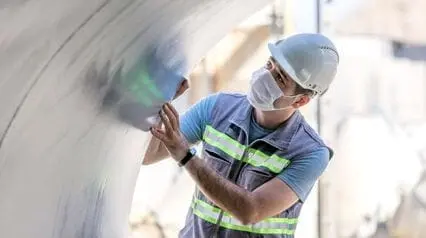What is a Construction Site Inspection?
A construction site inspection is a visual assessment of the work being performed at a construction site. It includes a variety of checks, such as the condition of the foundations, walls, floors, ceilings, and roofs. This process is typically conducted by a qualified individual, such as a licensed engineer, architect, or construction manager.
With this type of site inspection, the inspector can create and use a construction inspection checklist to check the safety and security of the site, as well as compliance with the local building code.
What is its Purpose?
The purpose of a construction site inspection is to ensure that the work is being performed in accordance with the plans and specifications. Construction site inspections are typically conducted on a regular basis, such as weekly or monthly.
Moreover, inspections allow construction professionals to identify potential issues and correct them before they result in serious problems. By catching issues early, inspections can save time and money.
Reasons Why It’s Important
Construction inspections are a vital part of the construction process. They help ensure that the project is completed in line with the plans and specifications. Here are five reasons why construction inspections are important:
Promotes Greener Construction
Inspections can help verify that buildings are being constructed using sustainable methods and materials. This is because there are specific environmental regulations that builders must comply with during construction.
Ensures Building Code Compliance
Construction inspectors help to ensure that buildings are being completed in compliance with all applicable building codes and regulations. This helps ensure the safety of the occupants and the overall structural integrity of the building. Hence, it can help assure that construction projects are safe for workers, occupants, and the surrounding community.
Detects Defects Early
Construction inspections can help to identify defects early on in the construction process. This allows for corrective action to be taken before the defects become more costly to fix. Inspections can help avoid potential problems, leading to fewer change orders.
Provides Quality Control
Inspections can help verify that buildings are being constructed to meet or exceed quality standards. Construction inspections help provide quality control by verifying that the construction is proceeding as planned and that the finished product meets the required specifications.
Saves Time and Money
Inspections can save time and money by identifying potential problems early on and ensuring that they are corrected before they cause delays or increase costs.
Factors to Consider for Construction Inspections
Below are some of the factors that are considered when doing a construction Inspection :
- Budget – What can the client afford? This includes the cost of the inspection, necessary repairs, and the overall project budget.
- Schedule – How much time do we have to complete the inspection? This includes the time needed for travel, setup, and the inspection itself.
- Access – What is the access like to the property? This includes parking, traffic, construction equipment, and more.
- Weather – What is the weather like? This includes temperature, humidity, wind, rain, and more.
- Safety – Is it safe to inspect the property? This includes working at heights, near power lines, in confined spaces, and more.
What to Expect at a Construction Site Inspection?
Typically, a construction site inspection includes a review of the project plans and specifications, a site walk-through with the contractor, and a review of the project schedule. The inspector will also look for any safety hazards and potential code violations.
In summary, the construction site inspection process can be broken down into three key stages:
- Pre-inspection – the construction site manager will assess the site and create a plan of action.
- During construction – the construction site manager will carry out regular inspections to ensure that all work is being carried out according to the plan.
- Post-construction – the construction site manager will conduct a final inspection to ensure that the site meets all the required standards.
Digitize the way you Work
Empower your team with SafetyCulture to perform checks, train staff, report issues, and automate tasks with our digital platform.
Get Started for FreeTypes of Construction Inspections
There are various types of construction inspections carried out during the course of a construction project. These inspections ensure the work is progressing as planned and the quality of the work is up to par. Here are five types of inspections done for construction sites.
Daily Site Inspections
Daily site inspections are conducted by the project manager or construction superintendent on daily basis to ensure that the previous day’s work has been completed satisfactorily. It also ensures that the work planned for the current day is on schedule.
Health and Safety Inspections
Health and safety inspections are conducted to identify potential hazards on construction sites and to ensure that safety precautions are being taken to protect workers, passersby, and nearby properties. Contractors must follow the Occupational Safety and Health Administration (OSHA) standards and ensure that the site meets the health and safety standards it requires.
Building Regulation Inspections
Building inspections are typically performed during the construction process to ensure that the work is being performed according to the approved plans and specifications. These inspections are typically conducted by the local building department or a professional engineer.
Quality Control Inspections
Quality control inspections are a way of making sure construction workers follow construction requirements and regulations. Conducting quality control inspections makes sure that the final product meets all the standards set by ISO 9000, the global industry standard for quality management. This helps refine the work before it’s presented to the client so that any issues that don’t meet the standards can be fixed.
Fire Safety Inspections
Fire safety inspections are performed to ensure that a building or structure complies with the fire code. These inspections are typically conducted by the local fire department.



